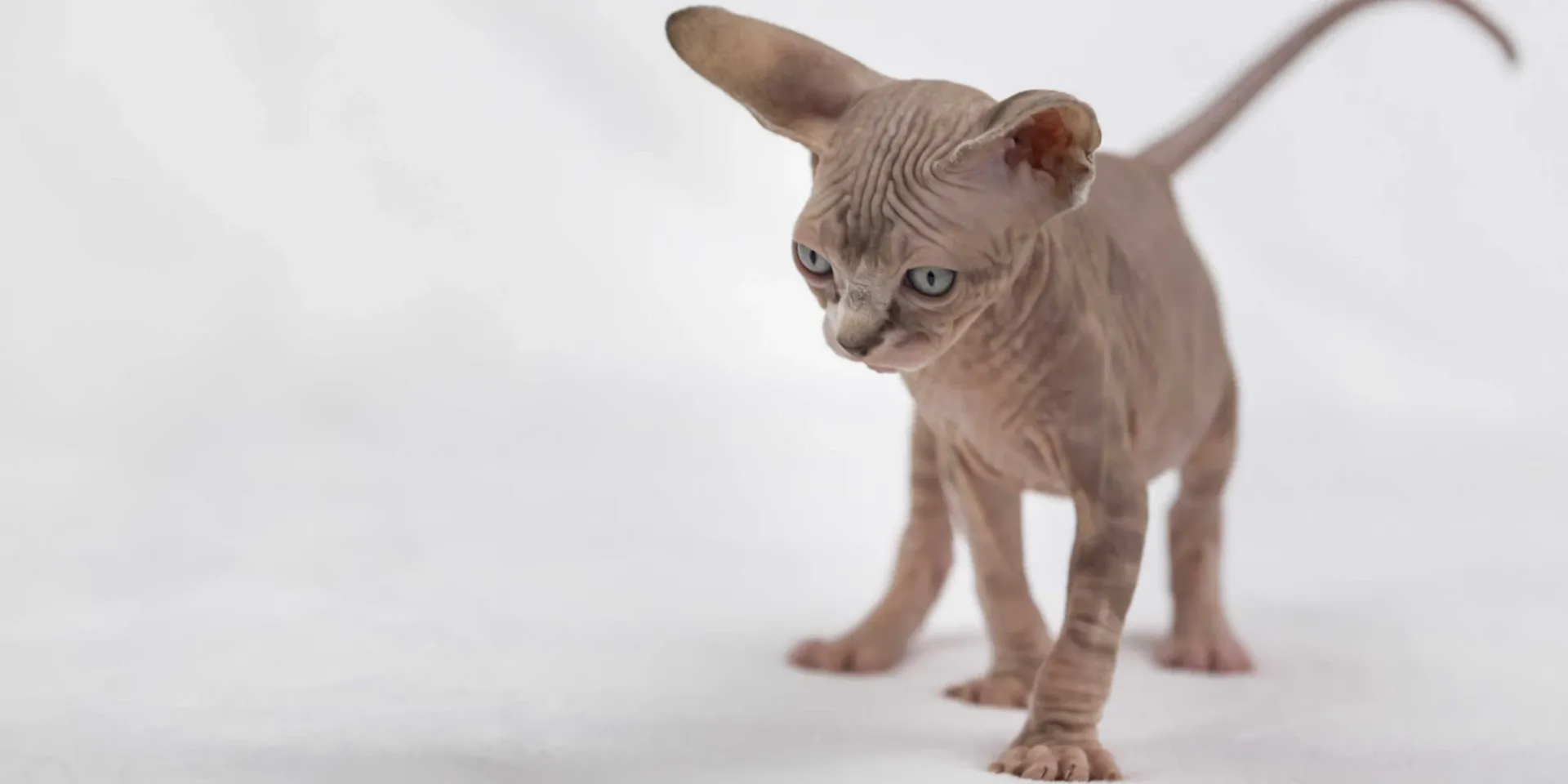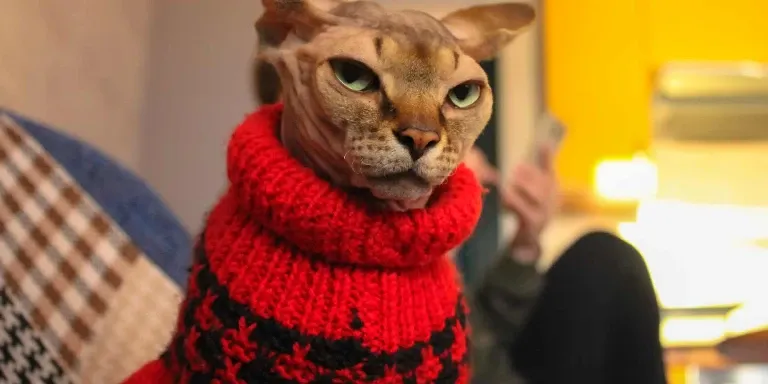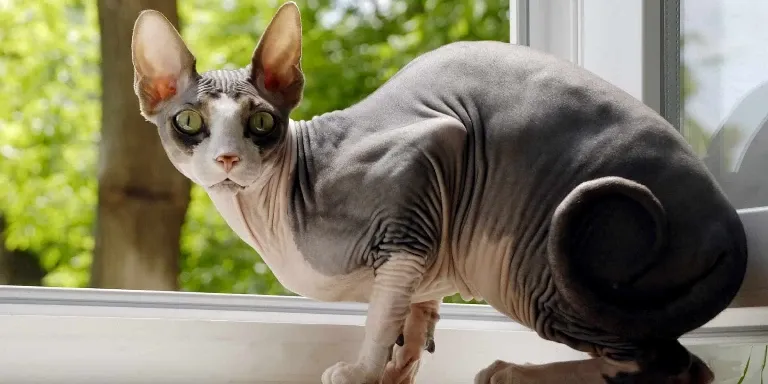The Best Fluffy Pancakes recipe you will fall in love with. Full of tips and tricks to help you make the best pancakes.

If you’ve ever considered getting a Sphynx cat, you may have been taken aback by their price tag. These hairless felines can cost anywhere from $1,500 to $5,000 or more. But why do they cost so much?
Sphynx cats cost so much because they are a rare breed and require specialized care. They don’t have fur, which means they need regular bathing to prevent skin issues, and they are prone to sunburn and cold temperatures. Breeding Sphynx cats is also more difficult and expensive than other breeds, which adds to their cost.
In this article, we’ll explore the reasons behind the high price of Sphynx cats, from their rarity to the specialized care they require.
First, it’s important to understand that Sphynx cats are a relatively rare breed. They were first bred in Toronto, Canada in the 1960s and are still quite uncommon today. This means that breeders have to put in a lot of time, money, and effort to produce a litter of healthy Sphynx kittens.
Additionally, because the breed is still so new, there is a limited gene pool, which can lead to health issues and a higher risk of genetic abnormalities. All of these factors contribute to the higher price of Sphynx cats.
Overview of the Sphynx Breed
If you’re looking for a unique and striking feline companion, there’s nothing quite like a Sphynx cat! This hairless breed originated in Toronto, Canada in 1966, when a hairless kitten named Prune was born. Breeding efforts began to create a hairless breed with a sturdy body and friendly disposition.
Today, Sphynx cats are recognized by most cat associations and have a devoted following. Despite their unusual appearance, Sphynx cats are known for their friendly and outgoing personalities. They are often compared to dogs in their behavior, following their owners around and seeking attention. They are also highly intelligent and enjoy interactive play.
Because of their people-oriented nature, Sphynx cats are not recommended for those who are often away from home. While Sphynx cats may come with a higher price tag than other breeds, it’s important to consider the cost of breeding and caring for these unique felines.
Sphynx cats require regular bathing to keep their skin clean and free of oils, which can be time-consuming. They are also prone to health issues such as skin irritations and respiratory problems, which require special care and veterinary attention. Additionally, the cost of breeding Sphynx cats is high due to the small gene pool and careful selection of breeding pairs to maintain the breed’s health and quality.
Rarity of the Breed
The scarcity of the Sphynx breed makes them highly sought after and can command a premium price. Their unique appearance and personality traits have made them popular among cat lovers worldwide. Due to their rareness, ethical breeding practices are necessary to ensure the health and wellbeing of the breed.
Breed popularity has contributed to the increase in demand and price of Sphynx cats. As more people become aware of this rare breed’s existence, they’re willing to pay a premium price to own one. The quirky and affectionate personality of Sphynx cats also adds to their appeal, making them a popular choice among cat enthusiasts.
Ethical breeding practices are crucial to the preservation of the Sphynx breed. Responsible breeders ensure that their cats are healthy and well-cared for, and they don’t overbreed them. This helps to maintain the quality and rarity of the breed while preventing health issues that may arise from inbreeding.
Breeders who prioritize the welfare of their cats and follow ethical breeding practices are essential in keeping the Sphynx breed sustainable.
Care and Maintenance
To properly care for your Sphynx, you’ll need to be diligent with their grooming requirements. These cats can accumulate oil buildup on their skin, which can lead to skin irritation and infections. Regular bathing is necessary to keep their skin clean and healthy. In addition to bathing, be sure to trim their nails regularly to avoid painful overgrowth and prevent damage to your furniture. Teeth cleaning is also crucial to your Sphynx’s overall health and well-being. Dental problems can lead to serious health issues, so it’s important to incorporate teeth cleaning into your cat’s regular routine.
Here are three important things to keep in mind when caring for your Sphynx:
- Grooming requirements: Sphynx cats require frequent bathing, nail trimming, and teeth cleaning. Without regular grooming, your cat may suffer from skin infections, overgrown nails, and dental problems.
- Dietary needs: Sphynx cats have high metabolisms and require a diet that is high in protein and fat to maintain their energy levels. It’s important to feed them a balanced diet that meets their nutritional needs.
- Health concerns: Sphynx cats are prone to certain health issues, such as heart disease and skin allergies. Regular check-ups with your veterinarian can help identify and treat any health issues early on.
Caring for a Sphynx cat requires a lot of effort and attention to detail. Be sure to stay on top of their grooming requirements, feed them a balanced diet, and keep up with regular check-ups to ensure they stay healthy and happy. With proper care and attention, your Sphynx can live a long and fulfilling life.
Health Issues
Regular check-ups with a veterinarian can help identify and treat potential health concerns for your hairless feline friend. Sphynx cats, like any other breed, have potential risks for certain health issues.
One of the most common concerns with this breed is hypertrophic cardiomyopathy, which is a genetic predisposition that can cause thickening of the heart walls. This can lead to heart failure if not caught early and treated properly. Regular check-ups with a veterinarian can help to detect any signs of this condition and allow for early intervention.
Another potential health concern for Sphynx cats is respiratory issues. Due to their lack of fur, they are more susceptible to colds and respiratory infections. Additionally, because they are a brachycephalic breed (meaning they have a short, flat nose and skull), they may have difficulty breathing. If you notice your Sphynx cat struggling to breathe or displaying any other respiratory symptoms, it’s important to take them to a veterinarian as soon as possible.
Sphynx cats may also be prone to skin issues and sunburn. Without fur to protect their skin, they may be more susceptible to sunburn and skin irritations. Additionally, they may be prone to acne and other skin conditions. Regular check-ups with a veterinarian can help to identify any skin issues and provide appropriate treatment. Additionally, it’s important to provide your Sphynx cat with appropriate sun protection, such as keeping them indoors during peak sunlight hours and using pet-safe sunscreen when necessary.
Breeding Costs
Breeding these hairless felines can really add up in expenses. The cost of breeding a Sphynx cat can be quite high due to the necessary genetic testing and health screenings. In addition, there are other expenses like stud fees and veterinary care for the mother and kittens.
All of these costs add up, making Sphynx cats one of the most expensive breeds on the market. One of the main reasons why breeding expenses are so high for Sphynx cats is because of the demand for the breed. Because Sphynx cats are in high demand, breeders can charge more for their kittens. This means that breeders need to invest more in their breeding programs to produce healthy, high-quality kittens that will satisfy the market demand.
Another factor that contributes to the high breeding costs of Sphynx cats is the health issues that are common in the breed. Breeders need to spend extra money on veterinary care to ensure that their cats are healthy and free from genetic disorders. They also need to invest in genetic testing to ensure that their cats are not carriers of any hereditary diseases that could be passed on to their offspring.
All of these expenses are necessary to produce healthy, happy Sphynx cats that meet the demands of the market.
Show Quality Standards
When it comes to show quality standards for sphynx cats, there are several important factors to consider.
Judging criteria is a key point to keep in mind, as judges will examine the cat’s physical characteristics and temperament.
Additionally, the importance of lineage and pedigree cannot be understated, as a cat’s family history can greatly impact its chances of success in a show.
Lastly, it’s worth noting that the cost of entering shows can be significant, as owners must cover expenses such as travel, lodging, and entry fees.
Judging criteria
Assessing the quality of a Sphynx cat involves several factors, including their body structure, skin texture, and overall health. When it comes to judging criteria for Sphynx cats, breeders and judges follow strict guidelines to determine the cat’s quality.
The cat’s body should be well proportioned and muscular, with a broad chest and a long, sturdy tail. The legs should be long and slender, with large, rounded paws. The head should be wedge-shaped, with large, wide-set ears and almond-shaped eyes.
In addition to physical characteristics, judges also assess the cat’s skin texture, which should be soft and velvety to the touch. Sphynx cats should not have any wrinkles, although small creases on the forehead and around the eyes are acceptable.
The cat’s overall health is also a crucial factor in determining its quality. Judges look for cats that are well-nourished, with bright eyes and a healthy coat. All of these factors, combined with breeding ethics and market demand, contribute to the high cost of Sphynx cats.
Importance of lineage and pedigree
If you’re looking to purchase a pedigreed Sphynx, it’s important to consider their lineage as a key factor in their value and desirability. Lineage selection has a significant impact on the quality and appearance of the cat.
Breeders carefully choose their breeding pairs to produce kittens that have desirable traits, such as a unique pattern or a friendly temperament. The more desirable the traits, the higher the value of the kitten.
Genetic testing is also a crucial aspect of lineage selection. Breeders need to ensure that they’re not breeding cats that carry genetic diseases that could be passed down to their offspring. By performing genetic testing, breeders can avoid producing kittens that are at risk of developing inherited diseases.
This helps to maintain the health and well-being of the breed. Therefore, when purchasing a Sphynx, it’s important to choose a breeder who conducts genetic testing and prioritizes lineage selection to produce healthy, high-quality kittens.
Cost of entering shows
You’ll need to budget for the expenses of entering shows, as they can quickly add up.
First, there are travel expenses. You’ll need to factor in the cost of transportation, lodging, and food for both yourself and your Sphynx cat. This can become especially expensive if the show is far away or requires a flight. To save money, you can try to carpool with other breeders or find affordable lodging options.
In addition to travel expenses, there are registration fees. These can range from $50 to $200 per show, depending on the organization and the type of show. You may also need to pay for additional services, such as grooming or professional photography. It’s important to carefully read the rules and regulations for each show and budget accordingly.
While the cost of entering shows may seem high, it’s necessary to establish your Sphynx cat’s reputation and win awards to increase their value and demand.
Transportation and Shipping
When it comes to transportation and shipping of Sphynx cats, there are several key points to consider.
Firstly, you must be aware of the legal restrictions and regulations related to cat transport.
Secondly, you need to factor in the cost of travel and accommodation for both yourself and the cat.
Finally, you need to ensure that your cat has all the necessary health certificates and vaccinations before embarking on any journey.
Legal restrictions and regulations
Although it may vary by location, legal restrictions and regulations can significantly impact the breeding and sale of sphynx cats, which can contribute to their high cost. Here are some of the regulations that breeders and sellers of sphynx cats may need to comply with:
- Breeding regulations: Some areas have specific laws that regulate breeding practices, such as limiting the number of litters that a breeder can produce per year or requiring specific health testing for breeding cats. These regulations can make it more difficult and expensive for breeders to produce healthy litters, which can drive up the cost of the cats.
- Licensing requirements: Depending on the location, breeders and sellers of sphynx cats may need to obtain specific licenses or permits to operate legally. These licenses often come with fees and requirements that can be costly for small breeders or sellers.
- Import/export regulations: For breeders and sellers who import or export sphynx cats, there may be additional regulations to comply with. These can include requirements for quarantine periods, health certifications, and customs fees.
- Consumer protection laws: Some areas have laws that protect consumers who purchase pets, such as requiring certain health guarantees or refund policies. Breeders and sellers who comply with these laws may need to invest in additional resources to ensure that they are meeting these requirements, which can contribute to the overall cost of the cats.
Cost of travel and accommodation
If you’re planning to travel to purchase a purebred Sphynx cat, keep in mind that the expenses for travel and accommodation can add up quickly.
Not only do you need to factor in the cost of transportation, but also the cost of a hotel or rental property to stay in while you’re away. Depending on where you live and where the breeder is located, you may need to book a flight or drive for several hours to reach your destination.
When it comes to travel expenses, it’s important to weigh the cost of transportation against the value of the cat you’re purchasing. If you’re buying a high-quality Sphynx that you plan to show or breed, the cost of travel may be worth it. However, if you’re simply looking for a companion pet, it may be more cost-effective to find a local breeder or adopt from a shelter.
Additionally, you may be able to negotiate with the breeder to split the cost of travel or find a way to transport the cat more affordably.
Health certificates and vaccinations
Don’t forget to obtain health certificates and vaccinations before bringing your furry friend home! As a responsible pet owner, it’s essential to ensure that your sphynx cat is healthy and free from diseases.
Before you purchase your cat, ask the breeder for their health records, including their vaccination history and health certificate. These documents will provide you with a clear understanding of your cat’s medical history and ensure that they are up-to-date with all the necessary vaccinations.
It’s important to note that obtaining health certificates and vaccinations can be costly. The cost breakdown can vary depending on your location and the type of vaccinations required.
However, veterinary expenses are an integral part of owning a pet, and it’s crucial to budget for these expenses. In addition to vaccinations, you may need to schedule regular check-ups with your veterinarian to ensure that your sphynx cat remains healthy and happy.
Remember that investing in your cat’s health can save you money in the long run and ensure that your furry friend lives a long and healthy life.
Does the Cost of Sphynx Cats Reflect Their High Maintenance Needs?
When considering the cost of Sphynx cats, it’s important to factor in their high maintenance needs. While they may be more expensive to purchase initially, the ongoing care and grooming required for Sphynx cats can result in higher overall expenses. Consulting a sphynx cat care guide can help owners understand and prepare for these needs.
Conclusion
So there you have it, it’s no wonder why Sphynx cats cost so much! With their rare and unique breed, high maintenance care, potential health issues, expensive breeding costs, and strict show quality standards, it’s understandable why their price tag is so high.
But for those who are willing to invest the time, money, and love into these hairless felines, the reward is immeasurable.
If you’re considering adding a Sphynx cat to your family, make sure you do your research and find a reputable breeder who can provide you with a healthy and well-socialized kitten. And don’t forget about the additional costs of transportation and shipping, as these can add up quickly.
But if you’re willing to make the investment, a Sphynx cat can make a loving and loyal companion for many years to come.
So go ahead and treat yourself to one of these little ‘naked’ wonders – you won’t regret it!








